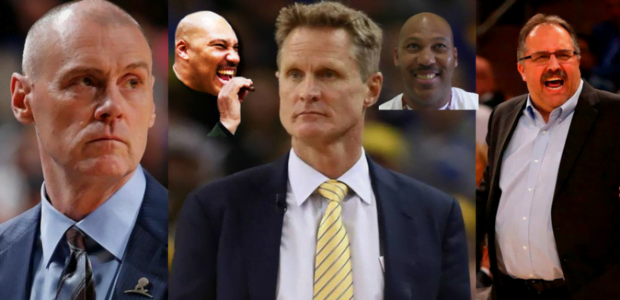The daily grind to crank out compelling content can be exhausting. Hosts and reporters are under constant pressure to locate superb material that will instantly drive clicks, views and listens which will become top of the mind discussion that can breathe life into the next day. More times than not the industry succeeds, but every now and then we’re handed a lemon.
In that pursuit for locating relevant stories worthy enough of the audience’s attention, we stumble across a few questionable characters. The thought of dedicating content time to them turns our stomachs but they also serve a purpose in generating buzz and higher ratings. We may question our own standards and journalistic integrity when highlighting a rotten apple but as long as the public is eating it up, we keep putting it on the plate and telling ourselves it’s a good meal.
But while there are plenty of people willing to sell their soul to generate an extra tenth of a ratings point, there are also a large number of hypocrites sitting on the other side of the fence.
 By now you’ve heard the name LaVar Ball so much that it’s likely caused you to increase your purchases of Tylenol or Advil. The more people pay attention to the sounds pouring out of this man’s mouth, the more he pushes the envelope to increase his celebrity. He may make your blood boil and cause you to question the media’s rationale for giving him air time but what he’s doing is nothing new. It’s what sold a lot of fights for Muhammad Ali. The only difference, Ali had real talent, Ball doesn’t.
By now you’ve heard the name LaVar Ball so much that it’s likely caused you to increase your purchases of Tylenol or Advil. The more people pay attention to the sounds pouring out of this man’s mouth, the more he pushes the envelope to increase his celebrity. He may make your blood boil and cause you to question the media’s rationale for giving him air time but what he’s doing is nothing new. It’s what sold a lot of fights for Muhammad Ali. The only difference, Ali had real talent, Ball doesn’t.
As foolish and outrageous as LaVar may be, my issue isn’t with him as much as it is with the hypocrisy I’m seeing in sports and media. Let’s start with the folks who have a problem with Ball being given exposure for his ridiculous commentaries.
Dallas Mavericks head coach Rick Carlisle was upset after learning of Ball’s criticisms towards Lakers head coach Luke Walton. The president of the coaches association said, “I view the recent ESPN article as a disgrace. They should look at their sources and do a better job of determining whether they have any merit or validity. Printing an article where the father of an NBA player has an opinion that is printed as anything like (it’s) legitimate – it erodes the trust we’ve built with ESPN and our coaches are upset because Luke Walton does not deserve that. To have to deal with these kind of ignorant distractions is deplorable.”
Golden State Warriors head coach Steve Kerr also had a problem with the story. The leader of the NBA champions added, “Somewhere LaVar is laughing at all of us. People are eating out of his hands for no apparent reasons other than he has become the Kardashian in the NBA. That sells. That’s what is true in politics, entertainment and now in sports. It doesn’t matter if there’s any substance involved with any issues. It’s just, ‘Can we make it really interesting for no apparent reason?’
“This is not a ESPN judgment. It’s a societal thing more than anything. We’re going away from covering the game and getting closer to sensationalized news. It’s really not news. It’s complete nonsense. If you package that irrational nonsense with some glitter and some ribbon, people are going to watch.”
 Taking it one step further was Detroit Pistons head coach Stan Van Gundy who said the article upset him so much that he was going to offer less access to ESPN when the network aired his team’s games.
Taking it one step further was Detroit Pistons head coach Stan Van Gundy who said the article upset him so much that he was going to offer less access to ESPN when the network aired his team’s games.
“I don’t have a problem with LaVar Ball. He’s a grown man. He can voice whatever opinion he wants. I got a problem with ESPN deciding that’s a story. I’m not meeting with their announcing crew before the game, I’m not doing the in-game interview. I’m not going to participate in the thing.”
Van Gundy’s brother Jeff, who works as ESPN’s lead analyst on NBA games agreed with the three coaches and took his own employer to task.
“Instead of focusing in on the real issues, Jeff Goodman and ESPN got what they wanted,” said Van Gundy. “They started a little fire and now everyone’s talking about it. The whole process is wrong when you write an article that doesn’t have one attributable quote — like the Patriots story.”
Upon hearing the reactions of multiple NBA head coaches, ESPN reporter Jeff Goodman, who wrote the Ball story, defended his piece.
“News has changed. I’ve been covering it for a long, long time now. What’s news today is not what was news five years ago, even two years ago. It is completely changed, and now, LaVar Ball saying what he did about Luke Walton is newsworthy. Nobody can doubt that.”

Goodman made it clear that he disagreed with Ball’s assessment of Walton and understands the public’s perception of him being a jackass, but that doesn’t mean his comments aren’t newsworthy.
“I understand thinking that LaVar is a buffoon, and that he doesn’t know what he’s talking about. But I’ve seen it a lot with college basketball and NBA coaches. They always protect their own. Do they have any more knowledge of the Lakers situation, and whether Walton has lost that team, than LaVar does? The answer is no. LaVar could be dead on, we don’t know that.”
Having now absorbed the information, I have a few thoughts I want to share on both sides of the issue. Let’s start with the defense of Ball being given air time and whether or not his comments are newsworthy.
The last time I checked, this is a free country right? We’re all entitled to freedom of speech and Ball just happens to speak a little louder than most. In some ways, he’s doing what so many talk show hosts strive to do each day – deliver a strong opinion, make a connection and generate a reaction. You may not like what he’s saying but if it wasn’t of interest to people it wouldn’t be given the frequency of air time that it’s received. By the way, we also have the choice about whether or not to pay attention to him or tune him out.
Secondly, when did we rewrite the rules to only feature credible individuals and hard hitting news on sports media shows and websites? I must have missed that memo.
We didn’t seem to have a problem building up P. Diddy’s interest in buying the Carolina Panthers. When Kate Upton sounded off about the voting for the 2016 Cy Young award because Justin Verlander didn’t win it, that seemed to be newsworthy. How about Katy Perry making college football picks on College Gameday, Chris Pratt eating toasted grasshoppers on SportsNation, and stories being written about what rapper Paul Wall would give the Astros if they could deliver a championship for the city of Houston?
Just this morning I’ve seen multiple media outlets run stories on Dr. Dre talking to Golden State Warriors players. Was that really newsworthy or were brands simply using the popularity of Dre’s name to drive clicks?
 On Tuesday afternoon I was driving to pick up my son from school when I landed on Stephen A. Smith’s show on ESPN Radio. What Smith said about the situation was right on point. It’s worth your time to listen back to it. I even convinced my fifteen year old to pay attention for a whole segment without checking Instagram, YouTube or Snapchat. That’s a whole other column though.
On Tuesday afternoon I was driving to pick up my son from school when I landed on Stephen A. Smith’s show on ESPN Radio. What Smith said about the situation was right on point. It’s worth your time to listen back to it. I even convinced my fifteen year old to pay attention for a whole segment without checking Instagram, YouTube or Snapchat. That’s a whole other column though.
Stephen A. mentioned that he didn’t particularly like that ESPN was covering the Ball’s in Lithuania but he took issue with Kerr, Carlisle and Van Gundy over their criticisms of the network’s decision making on news stories. Smith reminded them that they’ve been very outspoken on the political climate in our country which has zero to do with basketball. Yet when they’ve had something to say, ESPN has covered them. Some fans may agree with their political views but others don’t and would rather see them focus on basketball and avoid creating division.
Continuing on, Smith pointed out that whether you like it or not, LaVar Ball is the father of the number two overall pick in the 2017 NBA Draft who is now the starting point guard of the Los Angeles Lakers. He may be obnoxious, annoying, distasteful and classless but what he said about head coach Luke Walton is newsworthy. Smith even made the point, if LaVar went on the record tomorrow saying that Lonzo wanted to be dealt from the Lakers because Magic Johnson is inept at his job, would that not be something ESPN should share with fans?
We may agree that Kerr, Van Gundy and Carlisle have much more professional credibility than LaVar but that doesn’t mean his comments aren’t news. The Lakers knew this was a potential issue when they drafted Lonzo and when the outspoken and arrogant father goes on the record suggesting Walton isn’t good enough to lead the Lakers to success, that’s a story worthy of airtime. It’s certainly much more relevant than some of the examples I mentioned above.
I also think Jeff Van Gundy is way off track on this issue. I’m a fan of Jeff’s analysis and candid style, and I loved when he coached my beloved New York Knicks but if all stories required attributable sources the entire sports news cycle would be drastically altered. Off the record conversations happen frequently and are vital in addressing problems and creating solutions. Using the Tom Brady story as an example, it would be professional suicide for any member of the Patriots organization to go on the record blasting the greatest quarterback of all time.
However, in the case of the Ball story, LaVar did go on the record. The disagreement from these coaches stems from their belief that he shouldn’t be given a platform. The media outlets get to make that call, not the head coach of a basketball team with no knowledge of a brand’s content strategy and no personal investment in the success or failure of the company. Their one option is to choose whether or not to read and react to it.
So that’s one side of the discussion. Now let’s flip the script and look at the other side.
 If you’re sitting in your studio or office defending the coverage of LaVar Ball and citing the ratings spikes, web clicks and Facebook views as your evidence, stop it right now. Seriously, stop it. Remember this and never forget it, the media has a HUGE influence over people. If you feature someone repeatedly on television, radio and online, and tell the public they should care about it, eventually they start to follow it. The expression of the world being full of sheep and following the media’s message isn’t exactly untrue.
If you’re sitting in your studio or office defending the coverage of LaVar Ball and citing the ratings spikes, web clicks and Facebook views as your evidence, stop it right now. Seriously, stop it. Remember this and never forget it, the media has a HUGE influence over people. If you feature someone repeatedly on television, radio and online, and tell the public they should care about it, eventually they start to follow it. The expression of the world being full of sheep and following the media’s message isn’t exactly untrue.
Case in point, think back to the coverage provided towards Tim Tebow’s quest to be an NFL starting QB, Brett Favre’s problems with the Packers, Barry Bonds’ steroids allegations, Mike Tyson’s fights and real life problems or the latest case, the world according to Lavar Ball. When networks and websites sink their teeth into coverage of an individual or issue, they don’t let up until they squeeze every last drop out of it. That doesn’t mean the public is salivating over it, it means they’ve been beaten down enough to pay attention to it.
Do you honestly think one hundred thousand people would give a rat’s ass about watching a basketball game in Lithuania on Facebook featuring LaVar’s kids if the media wasn’t firmly behind it? In the words of Chad Johnson, child please!
The reason LaVar draws huge interest from the public is because he’s bombastic and flamboyant and the media loves to showcase personalities who operate that way. If an individual is willing to say controversial things which entertain us and cause mixed reactions, there’s always going to be a reporter on standby with a microphone, camera or pen.
How many times have you put on a radio station and heard a new song that you didn’t like? A few days later after hearing it five or six times your opinion switches to ‘maybe I rushed to judgment, it’s not that bad.’ After a couple more days, you start to actually like the song and tell others about it, and before you know it you’re either buying it on iTunes, Amazon, Spotify or in a store. The reason that happens is because the exposure to the content eventually wears you down. Whether it’s been LaVar Ball, the NFL’s TV ratings, Anthem protests or Colin Kaepernick being blackballed, if a story is told over and over again on every platform, eventually the public interest grows.
The other issues which are much more complex are determining what is news, what your professional standards are, and how much you’re willing to allow the pressure of increasing ratings to shape your editorial decisions.
 I’ve spent time inside a number of radio station sales departments and I’ve often heard them say they don’t sell ratings. What’s ironic about that is the people in the programming department inside the same building are working under the assumption that the ratings are vital to the station’s success. What you discover as you go along is that some brands can make a ton of revenue without numbers, some enjoy ratings wins but can’t scratch two nickels together, and others are exceptional at both.
I’ve spent time inside a number of radio station sales departments and I’ve often heard them say they don’t sell ratings. What’s ironic about that is the people in the programming department inside the same building are working under the assumption that the ratings are vital to the station’s success. What you discover as you go along is that some brands can make a ton of revenue without numbers, some enjoy ratings wins but can’t scratch two nickels together, and others are exceptional at both.
During the first ten years of my career I never went to work thinking about the ratings. That changed when I became a programmer. My focus then was to use my time and energy to develop topics, book guests, create production, events and ideas, meet the expectations of my bosses, and concern myself with what mattered most to my station’s audience. I didn’t stress over the sales department meeting their budget, the company needing to grow its stock price or anything else unrelated to content.
I suspect that there are many of you working in your station’s programming department reading this who operate the same way. If your program director never discusses the ratings and says they’re irrelevant to your performance, don’t build your show and make your daily content decisions based on whether or not they’ll generate a higher number. Do what feels right and interests your host and audience. If the ratings are a huge internal focus and a content strategy has been developed to help you be successful, then follow that game plan, ask questions, and analyze what is and isn’t working.
The reason that’s important is because the brand vision will influence how you make your editorial decisions. In the case of the LaVar Ball story, there are many outlets featuring his antics because it helps them capture an audience. Those brands have made it clear, the ratings DO matter. But you can also ignore the story and focus on other things and still have success. If you go that route though be consistent. Otherwise you’ll be called out for being hypocritical. That was the case this week with The Athletic who claimed to have a policy of ignoring LaVar Ball yet have wrote about him on multiple occasions.
I think it’s important to remember that disagreement is an essential part of life. There’s a growing problem in our country where we want to hear what we like and silence what we don’t rather than educating ourselves, welcoming an opposing view and increasing dialogue. There’s a need for both sides of a story to be presented. Steve Kerr, Stan Van Gundy and Rick Carlisle may not like LaVar Ball and ESPN’s decision to feature him, and they’re entitled to feel that way, but nobody forced them to read it or watch it. It’s not their place to dictate what ESPN should cover, and given the amount of money spent by the network on airing NBA games, I’d be all over the commissioner’s office if I were a Bristol suit making sure problems with the Pistons are solved before airing their next game.
The beauty of covering sports is that the majority of the content we work with focuses on things that most of us love or find interesting. We watch and attend games, talk to high profile people, and dissect what those individuals say about newsworthy material. We then form our own conclusions about the information we have at our disposal and invite further conversation with others over it. In that process we laugh, learn, love and loathe, and are left with something to think about before reconnecting.
 There are many who will change the channel when LaVar Ball and his family get mentioned. Others will turn up the volume to hear what he has to say. Personally I could care less about Lonzo, LiAngelo and LaMelo or if they have distant cousins named La Bamba, La Familia, and La Cucaracha.
There are many who will change the channel when LaVar Ball and his family get mentioned. Others will turn up the volume to hear what he has to say. Personally I could care less about Lonzo, LiAngelo and LaMelo or if they have distant cousins named La Bamba, La Familia, and La Cucaracha.
Rather than trying to decide who deserves air time, we should be thinking more about our brand’s identity and content strategy, and if the story fits and is one we can get behind consistently. It’s easy to sell the flavor of the month for a quick ratings surge but eventually a lack of substance will wear you out.
The power you wield sitting behind that microphone is strong. People will invest their time in your content if you tell them it’s relevant, worth their time, personally important, and in line with your brand’s standards. It’s the process of arriving at that point that’s complicated. Good luck finding your solutions.

Jason Barrett is the President and Founder of Barrett Media since the company was created in September 2015. Prior to its arrival, JB served as a sports radio programmer, launching brands such as 95.7 The Game in San Francisco, and 101 ESPN in St. Louis. He also spent time programming SportsTalk 950 in Philadelphia, 590 The Fan KFNS in St. Louis, and ESPN 1340/1390 in Poughkeepsie, NY. Jason also worked on-air and behind the scenes in local radio at 101.5 WPDH, WTBQ 1110AM, and WPYX 106.5. He also spent two years on the national stage, producing radio shows for ESPN Radio in Bristol, CT. Among them included the Dan Patrick Show, and GameNight.
You can find JB on Twitter @SportsRadioPD. He’s also reachable by email at Jason@BarrettMedia.com.








